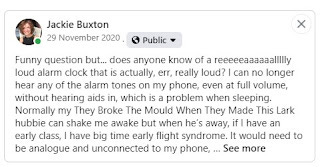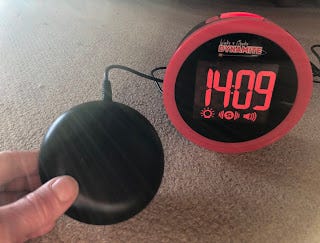Persistent Acts of Kindness
‘At least we won’t forget it!’
‘Imagine the stories for our grandchildren!’
You know, I love the human spirit in these situations, searching for the humour and positive. In truth – and please stay with me as I gloss over the fact that 2021 hasn’t exactly begun to a deluge of parties and hugs and burning of masks – 2020 will be the year we remember for all the wrong many of the wrong reasons.
There are heaps of us lucky enough (and this isn’t to forget those who’ve been hit so terribly hard) to have a list of things that have been an ‘improvement’ on pre-Covid life or, if that’s stretching it too far, a decent alternative.
One of the positives I’ve heard talked about far and wide is the receipt of random acts of kindness, those people with enormous hearts, ‘paying it forward’. It's that wonderful gesture from which the giver receives nothing concrete – the fabulous mood lifting power of a sense of wholesome well-being notwithstanding.
This happened to me totally unexpectedly at the end of last year.
My increasingly poor hearing has become more of an issue in recent years which you may have noticed in my increasing blog posts on this theme. I am also incredibly lucky. My type of hearing loss responds to hearing aids and mine are so good, that I can almost forget my hearing is so poor.
Until that is, I take them out.
An occasion where I am reminded that I am very hard of hearing is when I need to absolutely, and categorically, wake up. Combine the poor hearing with being an incredibly deep sleeper, and a broke-the-mould night owl (my life’s mission is addressing this: more about that here) and it presents a problem when I have an early flight, class, appointment, or even simply an over-spilling to-do list.
Luckily, my lark of a husband can be relied upon to shake me awake at any point post 6am. Earlier? Not a problem. If he’s not awake already, this alarm radio thing apparently clicks on to some dreary news channel and does the job. Personally, I can’t imagine a worse way to wake from peaceful slumbers, but that’s ok, because I can’t hear it anyway. I also can’t hear any clock. No, not the analogue ones with the bells either – I’ve tried them all. I certainly can’t hear my phone. That long list of tones and chimes you can set to bring you back from Slumberdom? I’ve tested each and every one without aids. At the absolute best, providing the volume is on max, there is the odd sound I can register as a sort of faint rattle.
That ain’t gonna work.
The closest I’d come to success was setting my Garmin watch to shake me awake and certainly, in a light sleep, I will notice my wrist being pummelled by my watch. But I’m oblivious in a deep sleep and thus this method is also not reliable for me.
Hence the problem, which is not an unusual one: if I can’t rely on something to wake me up when my human alarm clock isn’t available, I have Early Flight Syndrome every time. I wake several times in a panic, only to see the hands of the clock having inched forward since the last eruption into Wakedom. Off I return to my slumbers, only to repeat the process every half hour or so.

So, I decided to investigate. I posted on Facebook about this dilemma. Did anybody know of any alarm capable of waking this normally deep sleeping, poor hearer? So many people took the time to reply, often sending me links to various potential solutions, and I’d like to thank them first of all for that. You know we love to diss us humans but most people really are so very kind and helpful and that came through loud and clear – excuse the pun - in response to my slightly off the wall question.
Alas, many of the suggestions I’d already tried to no avail, but something piqued my interest. Following a very amusing comment by one friend who, it would appear, had been bi-passed when the cycadean rhythms were being handed out, and any of the other stuff that wakes a person, I looked into the Wake ’n’ Shake Dynamite (!)
This alarm clock booms out at a rude 95 decibels. The pneumatic drill is 120 decibels. A 110-decibel sound is the loudest an audiologist will play when testing your hearing (and only then if it's very poor). If you need a sound to be louder than 90 decibels for it to register, your hearing, at least in relation to that particular tone, is classed as profoundly deaf. I have a few sounds that I can hear at 95 decibels. But I wasn’t sure whether I had enough to hear the alarm alone.
There’s more. The clock has a funny little paddle attached which you stick under your pillow - it’s soft, no Princess and the Pea here - and that, well, as my amusing non-sleeping, incredibly helpful friend assured, ‘makes the earth move’. Excellent. And then, just so you can tick all boxes, there’s also a strobe light to join in the party.

This could be life changing. It's not cheap*, around the £40 mark when I was looking. But it was certainly going on my Christmas List.
Enter a fellow writer who I can’t profess to know very well at all. We are Facebook writing friends but have never met. A message popped up saying that this writer had tested this alarm clock for her blog and that if I could make use of it, it was mine. She wanted no money and wouldn’t even let me pay the postage.
Not only was I ridiculously excited to have potentially found the answer to my Early Flight Syndrome but I was also overcome with the kindness of people: how the ugliness of human nature often makes it to the fore of the news, and is repeated ad infinitum over the day, but there are random acts of kindness happening all day, every day, all over the world.
And this isn’t the first time this has happened to me in lockdown. Eleanor, I’m looking at you!
2020? The horrors are well documented and ongoing. They can’t be ignored, and they will be on the list to tell the grandchildren.
But the positive? Alongside the innate human ability to find a smattering of the good, positive and even humorous in a situation? The kindness of strangers! The love and power of community! This also needs to be sung from the rooftops.
Thank you, everyone. And may 2021 bring us more positives than negatives to tell the next generation.
Oh, The Wake ’n’ Shake! Does is work?
Let’s just say: the earth moves.
*The RNID (recently returned to their original name after ten years as Action on Hearing Loss) provides help in purchasing technology to assist with hearing loss. Find out more, here.
In non-COVID-19 times (temporarily closed), The National Deaf Children’s Society (NDCS) lend this type of technology out for your children to try before you buy.
The Wake ‘n’ Shake Dynamite Alarm is widely available. This links you to its listing in the RNID online shop



